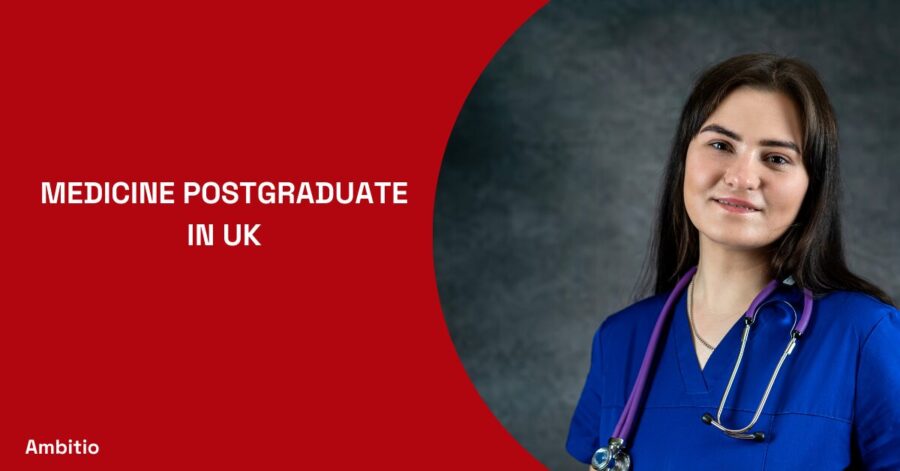14 December 2024
6 minutes read
Navigating Postgraduate Medicine in the UK

Embarking on the journey of postgraduate (PG) education in medicine can be a watershed moment for medical graduates. For those with an MBBS degree, particularly from India, the United Kingdom stands as a beacon of advanced medical education and research.
The UK’s history of excellence in medical training, combined with its array of specialized courses, presents a unique proposition for international students. This blog serves as an exhaustive guide for those looking to enhance their medical careers with a postgraduate degree in medicine from the UK.
Understanding the UK Medical Education Landscape
The Appeal of UK Postgraduate Medicine
The United Kingdom is home to some of the oldest and most prestigious medical institutions in the world. A PG degree from the UK is not just an academic qualification; it’s a hallmark of quality and expertise. International students are drawn to the UK for its high standards of education, the opportunity to work with leading medical professionals, and the access to state-of-the-art research facilities.
Furthermore, the UK’s healthcare system – the National Health Service (NHS) – is among the largest and most comprehensive public health systems globally. Training and studying in such an environment provide a rich learning experience, ensuring that postgraduates are well-equipped to deal with a myriad of medical conditions and patient demographics.
The Quality and Recognition of UK Medical Qualifications
UK medical degrees are recognized worldwide, and the qualifications earned are considered benchmarks in medical education. The General Medical Council (GMC), which is the regulatory body for doctors in the UK, sets stringent standards for medical education and practice.
This assures international students that the education they receive will be of the highest caliber, providing them with a competitive edge in the global job market.
Entry Requirements and Preparation for Admission
Meeting the Admission Criteria for PG Medicine in the UK
Gaining admission into a PG medicine course in the UK requires thorough preparation. International students must meet the standard admission criteria, which typically include:
- An MBBS degree or equivalent from a recognized university.
- Proof of English language proficiency, usually demonstrated by IELTS or TOEFL scores.
- Some universities may require the UK Clinical Aptitude Test (UKCAT) or the Graduate Medical School Admissions Test (GAMSAT).
- Relevant work experience or internships can bolster an application.
The PLAB and Alternatives: Navigating the Licensure Exams
For many international graduates, the Professional and Linguistic Assessments Board (PLAB) test is a gateway to medical practice in the UK. However, some PG courses may provide exemptions from PLAB, particularly those with an integrated training component leading to GMC registration.
Specializations and Coursework: Choosing Your Path
Deciding on a Specialty: From Acute Medicine to Research
Postgraduate medicine in the UK is not a one-size-fits-all approach. Students can choose from a variety of specialties, from clinical practice to academic research. Specializing allows students to become experts in their chosen field, whether it be acute medicine, pediatrics, oncology, or surgery.
The Structure of PG Medical Courses in the UK
Most PG courses in the UK are structured to provide a blend of theoretical knowledge and practical training. Coursework might include lectures, seminars, clinical rotations, and research projects. This comprehensive approach ensures that graduates are not only knowledgeable but also adept at applying their skills in real-world scenarios.
The Practical Aspects of Studying Medicine Postgraduate in the UK
Clinical Placements: Gaining Real-World Experience
Clinical placements are a cornerstone of postgraduate medical education in the UK. These placements offer hands-on experience in a variety of healthcare settings, from large hospitals to community clinics.
During these placements, students work under the supervision of experienced medical professionals, learning the nuances of patient care and medical practice in the UK.
Research Opportunities and Contributions to Medicine
The UK is a hub for medical research, and postgraduate students often have the opportunity to contribute to groundbreaking studies. Research-oriented programs may involve working in cutting-edge laboratories, participating in clinical trials, or conducting public health studies.
Networking and Professional Growth
Studying in the UK provides an unparalleled opportunity to build a professional network. Students interact with peers, educators, and medical professionals from around the world, fostering relationships that can influence their future careers.
Funding Your Education: Scholarships and Financial Aid
Embarking on postgraduate studies in medicine in the UK can be a pivotal career move for MBBS graduates. With a UK degree in hand, the world is quite literally your oyster. The opportunities are vast and varied, ranging from clinical practice and research to education and policy-making.
Securing Employment in the UK Healthcare System
After graduation, the most immediate pathway for many is to join the UK’s National Health Service (NHS). The NHS is one of the top employers of medical graduates in the world, known for its structured career progression.
Postgraduate qualifications from the UK are often tailored to the needs of the NHS, providing graduates with a competitive edge in job markets both within the country and internationally.
Integration into the NHS
For those looking to integrate into the NHS, the completion of postgraduate studies often leads directly to more advanced training positions. These can include specialty or general practice training posts, which are necessary steps toward becoming a consultant or a GP in the UK. These positions are not only well-respected but also come with the added benefit of further training and professional development opportunities.
Working in the UK vs. Abroad
Graduates with a UK postgraduate degree in medicine have a choice: to continue their medical practice in the UK or to take their skills abroad. The UK’s medical degree is highly regarded worldwide, opening doors to work in various healthcare systems. Some may choose to return to their home countries where their UK qualification allows them to occupy senior roles in clinical settings or academia.
Pursuing Further Specialization
The completion of a postgraduate medical course is often just the beginning of further specialization. Many graduates choose to continue their studies through subspecialty fellowships or doctoral research programs. These further specializations can lead to careers in highly specific areas of medicine, such as cardiology, neurology, or oncologic surgery.
Fellowship Opportunities
Fellowships offer an opportunity for graduates to become highly skilled in a niche area of medicine. They combine clinical work with research, enabling doctors to develop both their practical skills and contribute to the advancement of medical science.
In the UK, fellowship programs are often linked with universities and research institutes, giving graduates access to some of the best facilities and minds in the field.
Doctoral Research
For those inclined toward the academic side of medicine, pursuing a Ph.D. or a research doctorate can be an attractive option. This route is particularly beneficial for those looking to enter the field of medical research or take up teaching roles in medical schools. Doctoral research can also lead to careers in medical policy, where doctors can have a significant impact on healthcare systems and practices on a global scale.
Continuing Professional Development
The field of medicine is ever-evolving, and thus, continuous learning is a critical component of a medical professional’s career. The UK provides numerous opportunities for Continuing Professional Development (CPD), which is mandatory for maintaining registration with the General Medical Council (GMC). CPD can take many forms, from attending workshops and conferences to undertaking further courses in medical education.
The Role of CPD in Career Advancement
Engaging in CPD is essential not only for maintaining licensure but also for ensuring that one’s skills and knowledge remain at the cutting edge of medical practice. It opens up opportunities for career advancement, higher salaries, and positions of leadership within the healthcare sector.
The Impact of CPD on Patient Care
Moreover, CPD ensures that the care provided to patients is based on the latest evidence and highest standards. This commitment to professional growth reflects on the quality of the healthcare system as a whole and the trust that patients place in it.
Life After Graduation: Career Prospects and Continuing Education
The Path Forward: Employment and Further Training
A UK postgraduate medical degree opens many doors. Graduates can choose to practice medicine in the UK or elsewhere, continue their education with further specialization, or enter the field of medical research. The UK also offers structured training programs for doctors who wish to continue their education and specialize further.
Conclusion
Pursuing a postgraduate degree in medicine from the UK after an MBBS is a decision that can redefine a medical graduate’s career. It requires dedication, preparation, and the willingness to immerse oneself in a challenging yet rewarding educational environment.
For those willing to take this step, the UK offers a path to excellence in medical education and a rich professional life thereafter. With careful planning and determination, international students can navigate the complexities of admission, excel in their studies, and emerge as highly skilled medical professionals ready to make their mark on the world.
FAQs
What are the visa requirements for international students pursuing postgraduate medicine in the UK?
International students will need to obtain a Tier 4 (General) student visa. It requires proof of admission to a UK university, evidence of financial support, and English language proficiency.
Can I work in the UK while studying for my PG in medicine?
Yes, international students are allowed to work part-time during their studies, subject to certain restrictions and conditions as per their visa guidelines.
How can I ensure that the UK recognizes my MBBS degree?
You should ensure your medical school is listed in the World Directory of Medical Schools and check with the individual university for any additional requirements.
What is the average cost of a postgraduate medicine course in the UK for international students?
Costs can vary widely between universities and courses. Generally, international students can expect tuition fees to range from £20,000 to £45,000 per year, with living costs in addition.
Are there opportunities for postgraduate medicine students to engage in exchange programs?
Many UK universities have partnerships with institutions around the world, and exchange programs may be available. These should be discussed with the university’s international office.

You can study at top universities worldwide!
Get expert tips and tricks to get into top universities with a free expert session.
Book Your Free 30-Minute Session Now! Book a call now




























